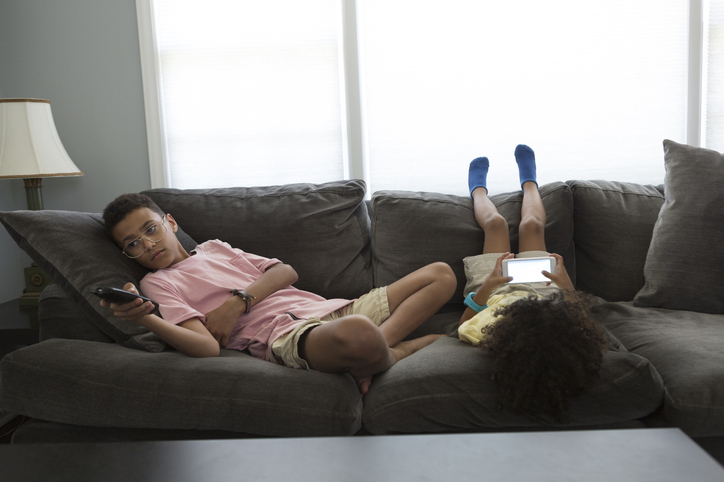By Dr. Ricardo Andres Medina-Centeno | Contributor
Spring in North Texas is typically peak season for outdoor activities, sports, adventures and playdates. With social distancing restrictions in place, kids are not only participating in less physical activities, but they are also turning to their screens more than ever before. From home schooling and socializing to esports and video games, screens have become a way of life. Because of this drastic diversion from everyday life, the Gastroenterology (GI) division at Children’s Health in Dallas and Plano has seen an increase in patients with screen time-related digestive conditions.
When thinking about the potential negative effects excessive screen time can have on kids, blurry vision, trouble sleeping and change in personality are a few that usually come to mind first. But the lesser thought about “digestion issues” happen to be some of the most common effects of excessive screen time.
Why? The GI tract and the brain are in constant communication with each other via something called the “brain-gut axis.” There are certain cells in everyone’s body that facilitate this connection, and because of this, mood affects the GI tract more than some might think. For example, when a child is worried about a test at school, they may experience stomach pain or even diarrhea. The same thing applies with excessive screen time. With kids experiencing less physical activity and more screen time than before, their mind-gut connection is affected.
Some of the more common conditions that result from this are cramps, constipation, stool accidents, abdominal pain and reflux. There can also be a trickledown effect caused by excessive screen time. If a child gets angry at the game they are playing, this might result in behavioral changes, which can throw off the digestive system. Kids also become so invested in their screens, they ignore the natural cues, causing them to forget to use the bathroom or even choose to not go because they don’t want to get up. Two additional frequent instigators of stomach issues associated with excessive screen time are the types of food kids eat and the amount of water they drink. Kids are relying on quick, “convenient” snacks (which are usually unhealthier) because they don’t want to miss whatever is happening on their screen. They are also not drinking as much water because they are not as physically active. This all takes a toll on the digestive system.
While excessive screen time is inevitable for kids to be able to appropriately adhere to social distancing protocols, there are things parents can do to help their kids avoid digestive issues and conditions:
- No matter how much kids must be on their devices, make sure they are taking breaks that require them to get up, move around and be active, if possible
- Try to limit recreational screen time to 20- or 30-minute increments
- Provide healthy snack options like fruits, vegetables and foods high in fiber
- Offer plenty of liquids, especially water
- Keep phones and other screens out of the bedroom, and eliminate screen time immediately before bed
- Monitor bathroom habits and frequency to know if they are going too frequently or less often than usual
- If the child complains about stomach pain or tightness, consult their pediatrician
Editor’s Note: The pediatric GI team at Children’s Health℠ treats everything from constipation and celiac to IBD and liver diseases and offers minimally invasive diagnostic techniques and the latest innovative treatments delivered with a personalized approach that prioritizes peace of mind. Their world-renowned specialists work with pediatricians to determine the underlying causes and offer education and support to help your child get back on track.
The Gastroenterology division at Children’s Health℠ ranks among the top 10 pediatric GI specialties according to U.S. News and World Report, serving patient families who rely on them for trusted and innovative care.
ABOUT DR. RICARDO ANDRES MEDINA-CENTENO:

Ricardo Medina-Centeno, M.D., received his medical degree from the University of Puerto Rico. He completed his pediatric residency at the University of Florida College of Medicine and his pediatric gastroenterology, hepatology, and nutrition fellowship at UT Southwestern (UTSW) Medical Center. During his fellowship, he trained with prominent experts in the field of neurogastroenterology and motility disorders at UTSW and Boston Children’s Hospital (Harvard University). Dr. Medina-Centeno is currently an Assistant Professor in the Department of Pediatrics at UTSW and provides medical care at Children’s Health in Dallas and Children’s Health in Plano.


